When Wang Zongde filed a lawsuit against Kweichow Moutai, the world’s most valuable liquor company, he knew the chances of securing a win for his family-run business were slim.
Yet he felt that the David and Goliath battle against the giant state-owned company was worth it, if only to highlight that — in Wang’s opinion — Kweichow Moutai was wrongfully claiming credit for his family’s achievements.
Ronghe Distillery was founded by Wang’s ancestors and has been passed down for five generations since its inception at the end of the Qing Dynasty. Early on, says Wang, the small brand from Guizhou province won a gold medal in the alcohol category at the 1915 Panama-Pacific International Exposition. The world’s fair, held in San Francisco to celebrate the completion of the Panama Canal and the 400th anniversary of the Pacific Ocean’s discovery, awarded over 25,500 prizes — with 1,200 going to Chinese products of all sorts.
A hundred years later, however, Wang found that Kweichow Moutai had started to promote its baijiu at home and abroad with claims that the liquor was “a golden prize winner” at the expo — an assertion Wang says only his family’s liquor can make.
“My family’s reputation can’t be claimed by others,” Wang tells Sixth Tone. Two years ago, he filed a lawsuit against Kweichow Moutai, accusing the company of infringing on his brand’s “right to reputation,” as stipulated in China’s civil law.
Wang Qican explains how to identify a good-quality ‘baijiu.’
Yet the relationship between Ronghe Distillery and Kweichow Moutai is not so clear-cut, and the case speaks to the murky development of China’s baijiu industry against the backdrop of changing political tides.
When Ronghe was founded in the early 1900s, small, family-run distilleries dominated the baijiu market. But after the Communist Party took power in 1949, private businesses were forced to enter public-private joint ventures or have their assets confiscated. Ronghe was acquired by the central government and, in the 1950s, merged with two other distilleries to form Kweichow Moutai.
Under the centrally planned economy, private businesses ceased to exist in the 1960s and 1970s, but they were once again permitted during China’s reform and opening-up period under Deng Xiaoping. In the 1980s, Wang revived the family’s private distillery, producing liquor according to his ancestors’ traditional methods.
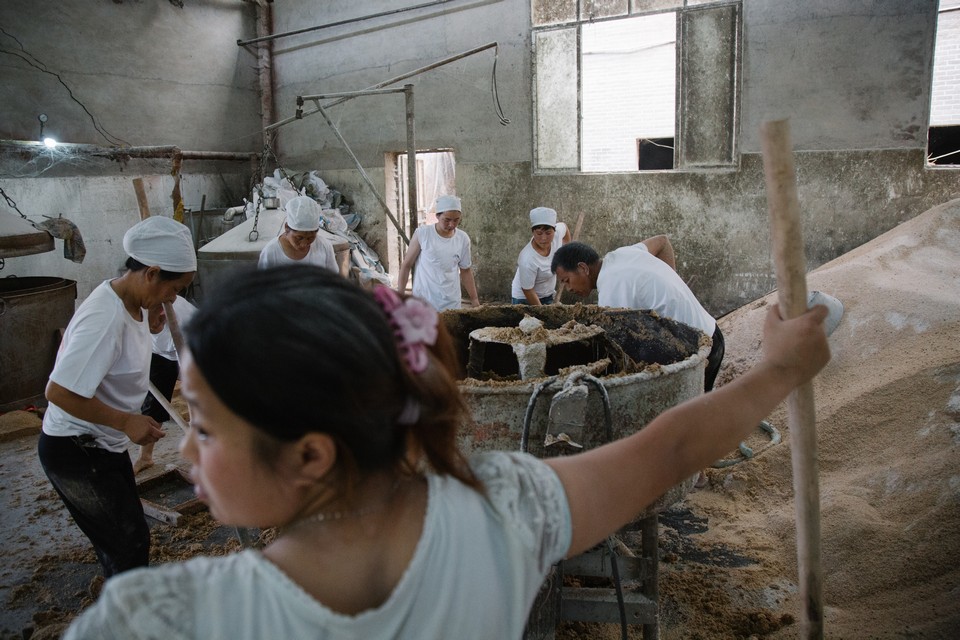
Workers are busy in the fermentation room at the Wang family ‘baijiu’ factory in Maotai Town, Guizhou province, July 15, 2017.
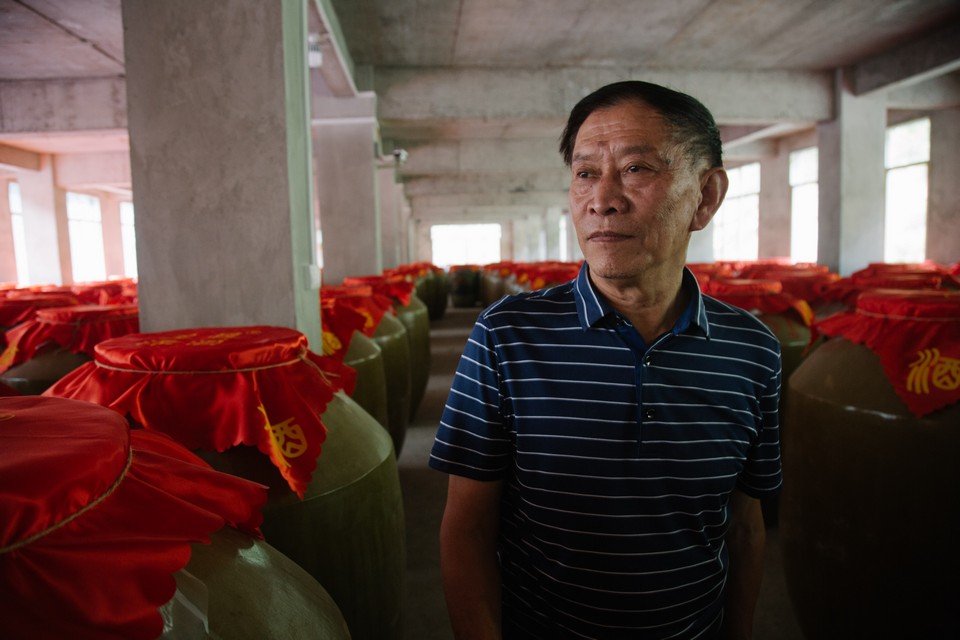
Wang Zongde poses for a photo at his family’s ‘baijiu’ distillery in Maotai Town, Guizhou province, July 13, 2017.
By 4 a.m., a dozen workers have already started their day in the fermentation room of the Wang family baijiu factory. The men use shovels to mash wheat, while the women knead a grain-and-water mixture into rectangular molds with their feet. Dressed in a short-sleeved collared shirt and carrying a wooden cane, 70-year-old Wang still looks spry for his age — though he officially handed the business over to his sons in 2011. Wang Lei, 28, dropped out of his second year of university to return home and support his father. His older brother, 41-year-old Wang Qican, went straight into the family business after high school, having learned baijiu distilling, blending, and tasting methods since age 15.
“The techniques have been passed down for hundreds of years,” the elder Wang says as he moves through the factory. “This is just the beginning of the yearlong production cycle.”
Since 2000, baijiu fever has gripped Maotai Town, considered the home of the nation’s top baijiu brands. According to local officials, the town has more than 1,600 distilleries in operation, many of which belong to small-scale producers — and most of which lack proper licenses.
While competition among smaller brands is fierce, Kweichow Moutai is the clear top dog. The company adopted the “golden prize winner” title in 2003, printing it on labels and using it in advertising in both the domestic and international markets. Shen Yong, a marketing expert at a Nanjing-based management consulting firm, says the gold medal claim has been vital to Moutai’s marketing strategy.
-
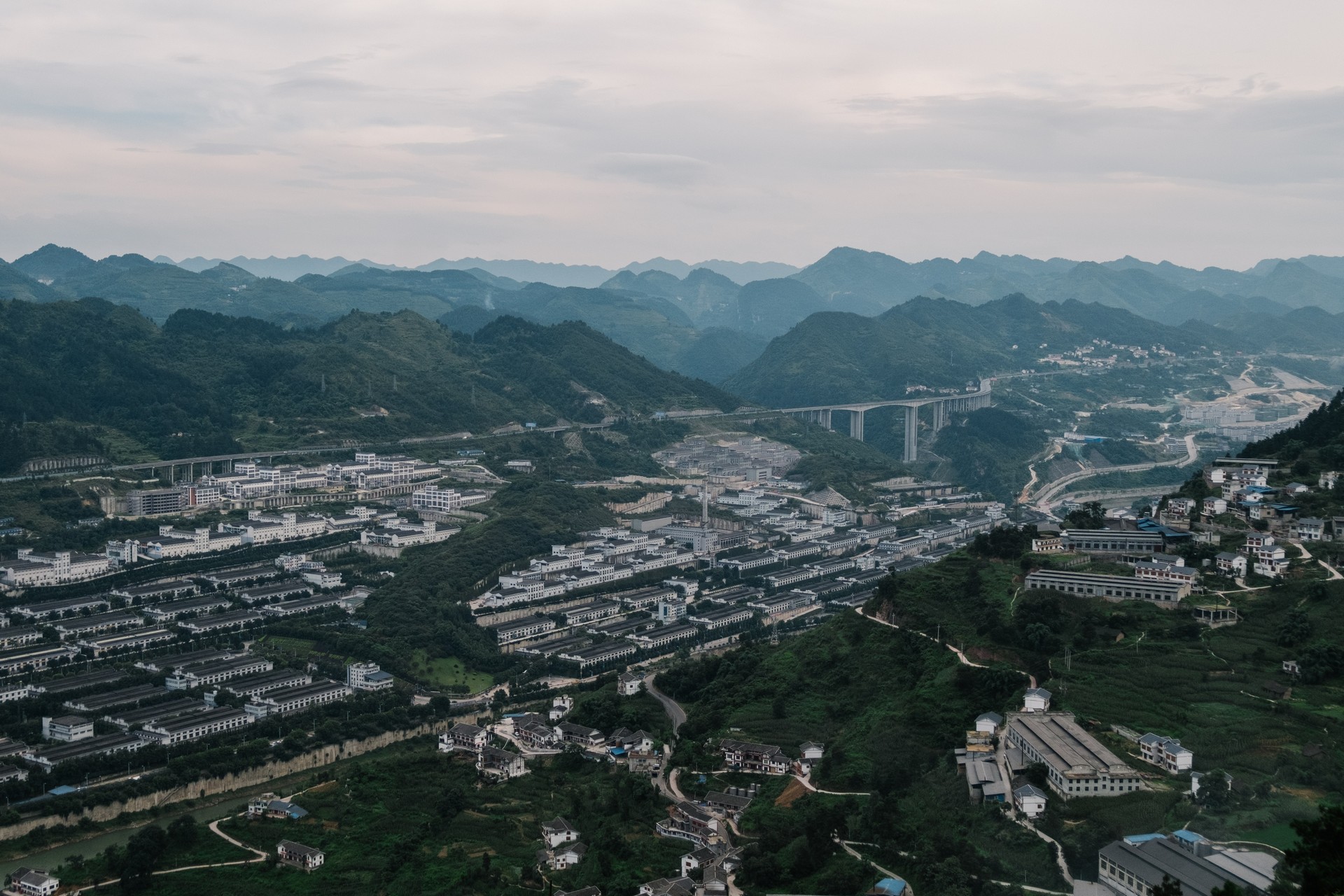
An aerial view of the Kweichow Moutai distillery, which occupies a large swathe of land near the Chishui River, Guizhou province, July 13, 2017.
-
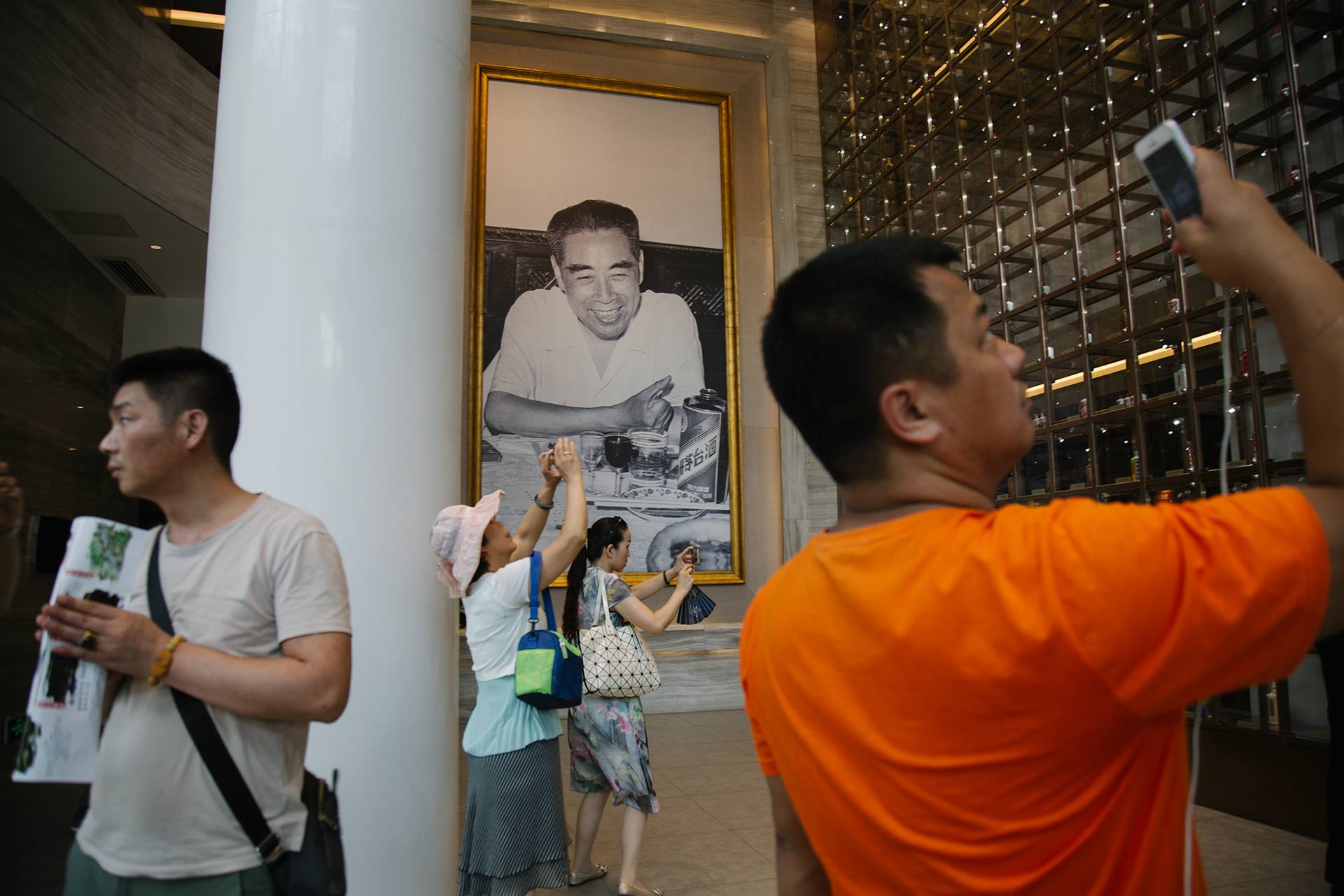
Tourists visit the ‘baijiu’ museum in Maotai Town, Guizhou province, July 14, 2017. On the wall hangs a portrait of former Premier Zhou Enlai with a bottle of Kweichow Moutai-brand ‘baijiu.’
-
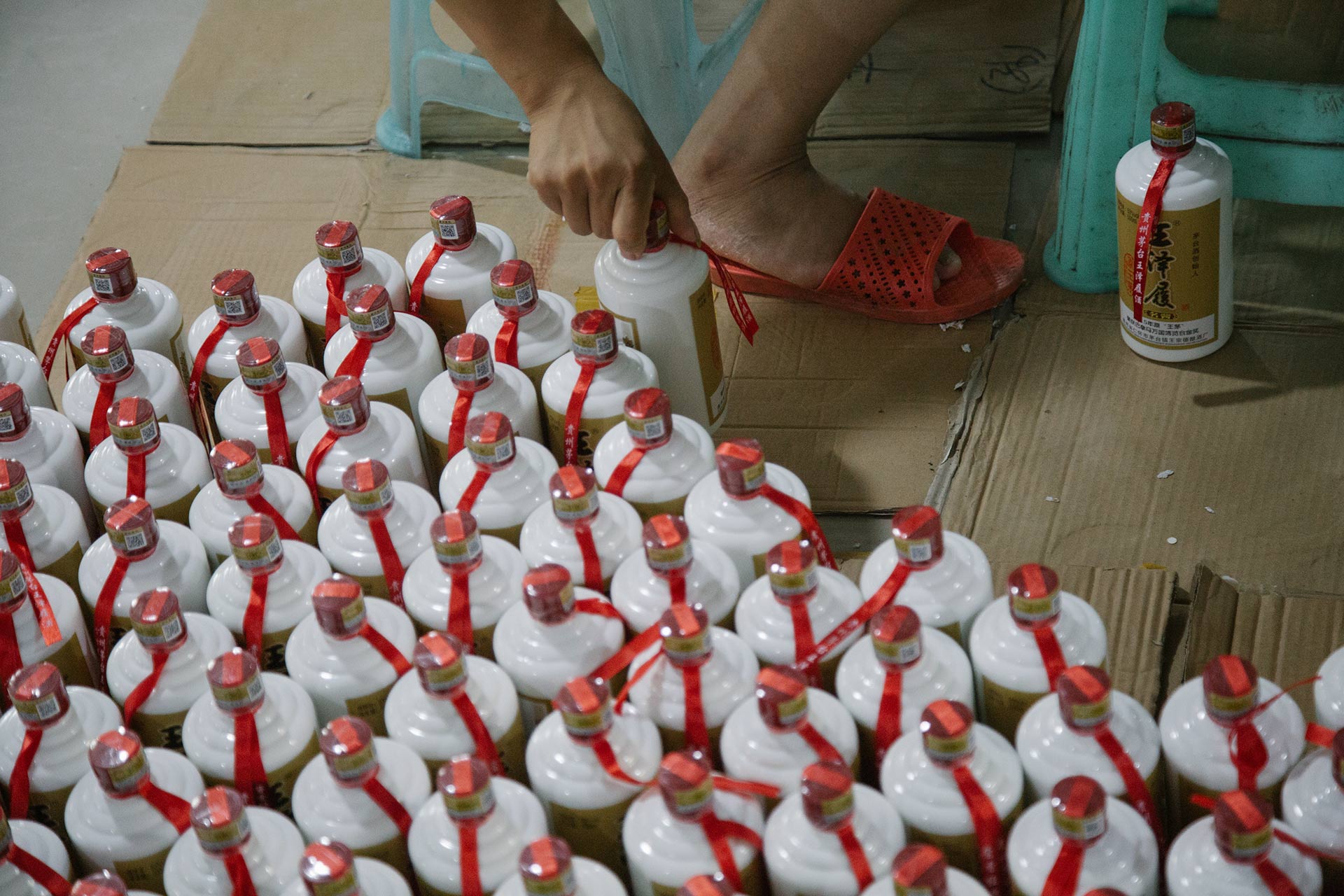
A worker at Wang Zongde’s ‘baijiu’ factory labels liquor bottles in Maotai Town, Guizhou province, July 13, 2017.
“The prize helped Moutai build its brand value in the international liquor market, and brand value always plays an important role in determining product value,” Shen tells Sixth Tone. “Using such a story as a marketing tool helps consumers remember the company and its products more easily.”
The claim has been so valuable, in fact, that Kweichow Moutai organized a lavish ceremony to celebrate the 100-year anniversary of the prize in 2015. That year wasn’t a good one for Kweichow Moutai, however: Wang Zongde filed his lawsuit with the Intermediate People’s Court in Zunyi, the city that has jurisdiction over Maotai Town, in a bid to stop Kweichow Moutai from using the title in ads and on product packaging, on the grounds that it was misleading to consumers. The company, he argued, should also apologize for its wrongdoing through national media.
Around the same time, the prize elicited public scrutiny after the Hubei-based newspaper Changjiang Times reported that the liquor had, in fact, won a silver medal at the 1915 expo — not a gold medal as advertised. In its defense, Kweichow Moutai posted an article on its website calling the debate “meaningless” and accusing those who started it of harboring ulterior motives.
Wang Zongde isn’t alone in taking legal action. Another of the three distilleries that merged to become Kweichow Moutai in the 1950s filed a trademark lawsuit against the liquor giant in 2014. Hengxing Distillery resumed its private operations in the ’80s and sued to reclaim ownership of the brand Laimou, which it created in 1929. Though Kweichow Moutai wasn’t producing baijiu under the brand at the time, it held the trademark rights to Laimou and won the dispute.
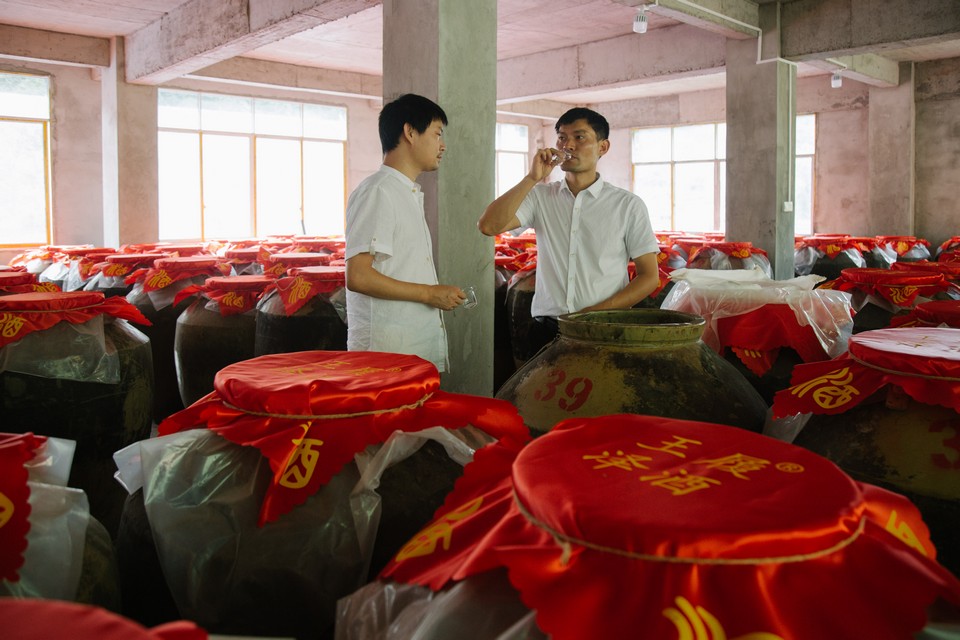
Brothers Wang Lei (left) and Wang Qican sample ‘baijiu’ at their family’s distillery in Maotai Town, Guizhou province, July 13, 2017.
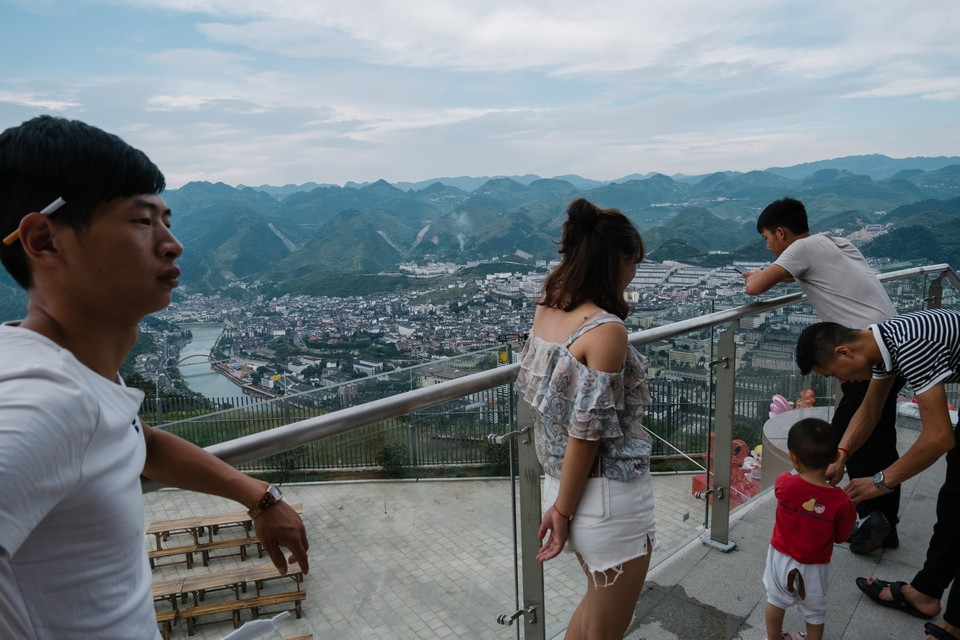
Tourists take in the view from an observation deck in Maotai Town, Guizhou province, July 13, 2017.
The Wang family’s case, too, was ultimately dismissed, as the court ruled it “not improper” for Kweichow Moutai to use the prize claim in its marketing, on the grounds that the state-owned company had “inherited” and developed the business after the merger. Wang Zongde appealed to the Guizhou High People’s Court, which upheld the verdict last year.
Given that many Maotai Town residents have long-standing family ties to smaller baijiu producers, the success of Kweichow Moutai has stirred up some ire. “Many locals attended the hearing in support of Wang,” says Sun Zhao, the lawyer representing Wang Zongde in the suit. Sun calls the verdict “specious and groundless,” arguing that the right to reputation under Chinese civil law has been given insufficient attention in legal disputes.
When contacted by phone, Kweichow Moutai staff repeatedly said that no one with the authority to answer Sixth Tone’s questions was available, and eventually stopped answering Sixth Tone’s calls.
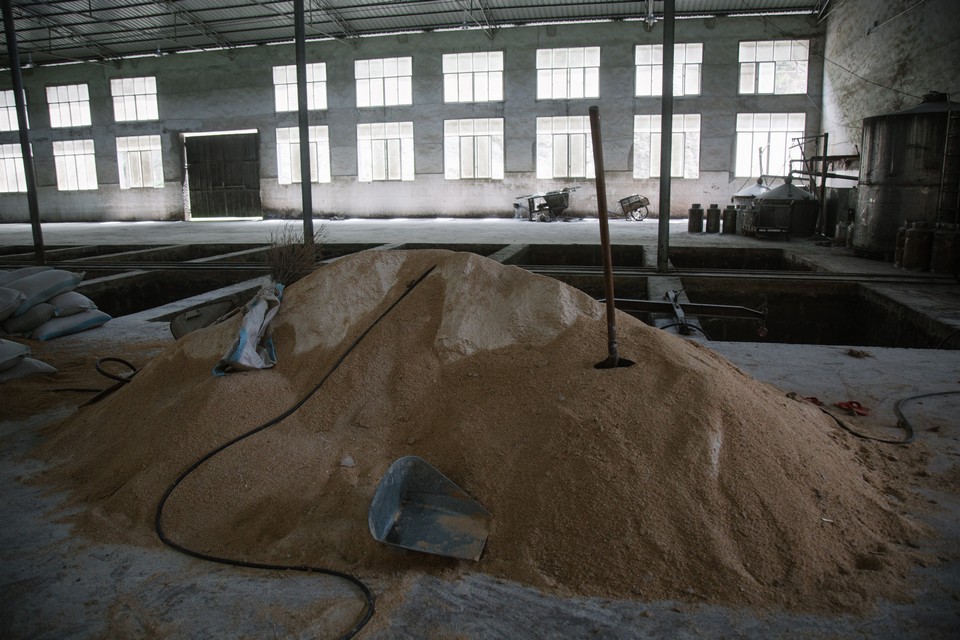
A pile of ground wheat sits in the fermentation room at the Wang family ‘baijiu’ distillery in Maotai Town, Guizhou province, July 16, 2017.
Shanghai-based lawyer Ding Jinkun of DeBund Law Offices says it would have been tough for Wang Zongde to win the lawsuit, as the existing legislation does not make it clear whether reputation can be inherited. “It’s more a systemic issue than a legal dispute,” Ding says, explaining that a win for the Wang clan could have set a precedent for future lawsuits brought by those who saw their family businesses taken over by state-backed companies in the ’50s.
Today, the Wang family factory produces around 1,200 tons of baijiu annually — a small fraction of the 60,000 tons Kweichow Moutai produced in 2016. “We can’t compete with Moutai Group,” says Wang Lei.
The elder Wang says his family is still deciding whether to appeal to a higher court in Beijing. He feels that he’s losing out on what could be the family’s fortune. “One player cannot monopolize [all the resources],” he says, “and it’s my responsibility to carry on the family business, which traces its success back to the Qing Dynasty.”